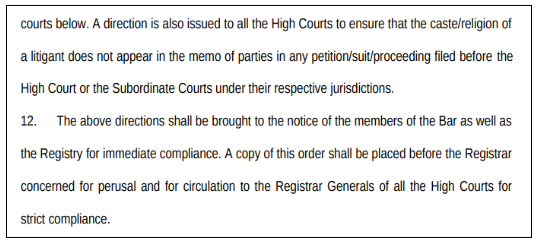In this edition of the Court judgements review, we look at SC’s directions that Offence must be committed on ground of caste for conviction under SC/ST PoA Act, SC’s observation that if a woman’s consent was secured through a false promise of marriage from the beginning, it would constitute rape, SC’s directions that Caste or religion of parties should not be mentioned in any court documents.
SC: Offence must be committed on ground of caste for conviction under SC/ST PoA Act
In Dashrath Sahu vs. State of Chhattisgarh, the accused-appellant was convicted by the trial court for offences under Sections 451, 354 of the IPC, and Section 3(1)(xi) of the SC/ST PoA Act which deals with trespassing, criminal intent to offences against women and atrocities against members of Scheduled Castes or Scheduled Tribes. He was sentenced to undergo simple imprisonment of one year and a fine.
The accused, dissatisfied with the conviction, appealed to the High Court. The High Court upheld the conviction under the SC/ST PoA Act but acquitted the accused for the offence under the IPC. The reason for sustaining the SC & ST PoA Act conviction was cited as the non-compoundable nature of the offence committed by the accused under this Act. He then filed an appeal before the Supreme Court.
The Supreme Court Bench of Justices B R Gavai, Prashant Kumar Mishra and Sandeep Mehta observed that according to Section 3(1)(x) of the SC/ST PoA Act, the offence must be committed upon a person belonging to Scheduled Castes or Scheduled Tribes with the intention that it was being done by virtue of their caste. In this case, even upon considering the most serious accusations made by the complainant, the court noted that the accused did not commit the alleged act to target a person belonging to the Scheduled Caste and acquitted him of the charge.
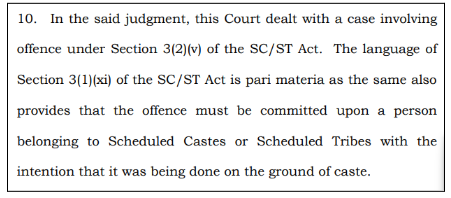
SC: If a woman’s consent was secured through a false promise of marriage from the beginning, it would constitute rape
The appellant in the case Sheikh Arif vs. State of Maharashtra was accused of establishing a physical relationship with a woman under a false promise of marriage. The woman later discovered pictures of the man’s engagement to another woman following which she filed an FIR. However, the appellant contended that he had married her in 2017. He produced a copy of ‘nikahnama’. They also had a child born out of their relationship. Following Bombay High Court’s refusal to quash the rape allegations against him, the appellant filed the plea before the Supreme Court.
Supreme Court Bench of Justices Abhay S Oka and Pankaj Mithal observed that the second respondent (the woman) was an adult when she entered into a physical relationship with the accused. Further, she also admitted that they got engaged willingly. Nevertheless, she refutes that she got married to the appellant. The bench concluded that the accusation of a false promise to marry was not valid from the beginning as the woman engaged in a physical relationship was not solely due to the appellant’s promise of marriage. If a woman’s consent was obtained through a false promise of marriage right from the beginning, it would have constituted the offence of rape, according to the Bench. Even though the woman denied the marriage, the man had submitted sufficient evidence, in the form of a Nikahnama (marriage certificate), to support his claim of having married the woman. Stating that pursuing the case further would be a serious abuse of legal procedures, the court quashed the allegations and allowed the appeal.
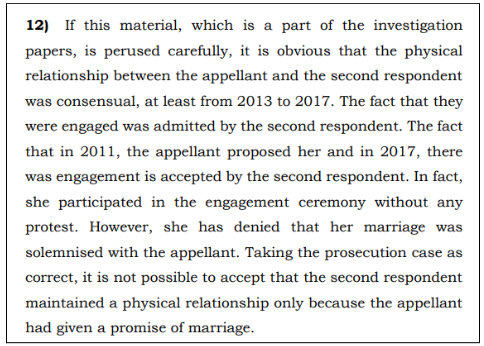
SC: Doctor was directed to pay an additional fine of Rs. 50,000 to complainant for false representation
An 84-year-old PC Jain claimed that he lost his vision in his left eye in a surgical procedure carried out by the respondent, Dr R P Singh. He filed a consumer case in 2005 in the District Consumer Disputes Redressal Commission in Faridabad in 2005. The commission held the doctor guilty and directed the doctor to give compensation of Rs. 2 Lakhs with interest from the date of filing of the complaint till the date of realization. The order was challenged by the respondent in the State Commission which held that the surgery took place in New Delhi and the Faridabad Court had no territorial jurisdiction to decide the case.
The appellant approached the National Commission which reversed the State Commission’s decision and allowed the compensation at a lower interest. He then appealed to the Supreme Court seeking the release of the compensation amount, challenging the ex-parte order from the NCDRC that documented the patient as having received the compensation. Contrarily, according to the patient’s account, they had not received any part of the compensation from the doctor. The patient alleges that the doctor misrepresented the facts to the NCDRC, leading to the issuance of such an order.
The Justices B.R. Gavai and Sandeep Mehta, upon acknowledging that the patient had not received any compensation for the loss of vision due to medical negligence, instructed the doctor to pay Rs. 2 Lakhs in compensation along with a 12% per annum interest within two months. Failure to comply would result in an increased interest rate of 15% per annum. Further, the court levied a penalty of Rs. 50,000 on the doctor for falsely claiming that the compensation had been disbursed to the patient.
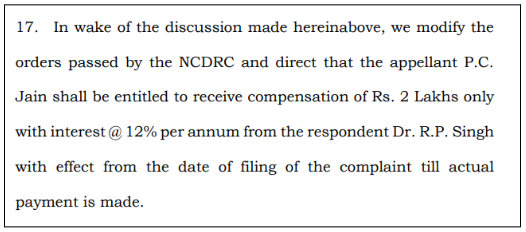
Bombay HC: Split verdict given on constitutional validity of new IT amendment rules
In Kunal Kamra vs. Union of India, the petitioner asserted that he was a political satirist who was heavily dependent on social media for content sharing. He claimed that the latest amendment to the IT Rules would result in arbitrary censorship and lacked the essential safeguards to preserve the freedom of satire. The Information Technology (Intermediary Guidelines and Digital Media Ethics Code) Amendment Rules, 2023 empowers the Centre to establish a fact-checking unit (FCU) to identify fake, false and misleading information about the government’s business on social media platforms.
His concern was that his content could be blocked, or removed, or his social media accounts might face suspension or deactivation. The Ministry of Information and Technology argued that ensuring “authentic information” about government matters undergoes fact-checking by a government agency (FCU) is in the public’s best interest. This is intended to contain any potential harm to the general public.
The Bench of Justices Gautam Patel and Neela Gokhale of the Bombay High Court heard the case and delivered a split verdict. Justice Gautam Patel’s decision favoured the petitioners while Justice Neela Gokhale’s decision favoured the amendment.
Justice Gautam Patel’s decision stated that it was unthinkable that one entity, would be unilaterally identified by the State and be given the authority to pick and decide what is true, fake, false, or misleading. He added that the government’s argument is flawed, assuming that it needs to act like a parent ensuring citizens only receive what it deems ‘correct information.’ This contradicts the fact that the government already has a strong and authentic voice.
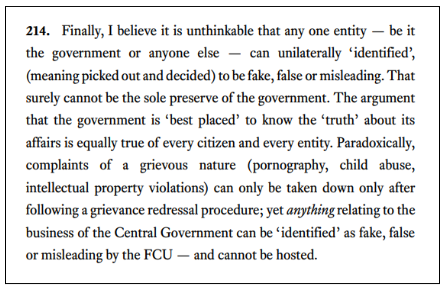
Meanwhile, Justice Gokhale argued that the rule, involving a government official-staffed FCU, doesn’t violate Article 14. According to her, users have the right to approach grievance redressal mechanisms and the courts. She emphasized that the rule doesn’t restrict content unless it’s patently false, communicated with malice, and deceptively presented as truth. She stated that challenges based on potential abuse are unfounded and premature, given the FCU’s unknown character and concluded that the government’s measures align with the law’s objective, emphasizing citizens’ right to authentic information in a participative democracy.
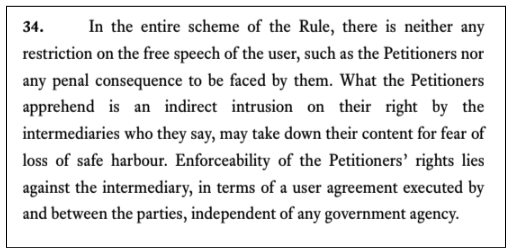
SC: Caste or Religion of parties should not be mentioned in any court documents
Justices Hima Kohli and Ahsanuddin Amanullah, presiding over a family dispute transfer petition, Shama Sharma vs. Kishan Kumar, objected to the mention of the parties’ caste in the court documents. They emphasized discontinuing this practice, stating it should be ‘shunned.’ The petitioner’s counsel explained the registry’s objection to altering the memo of parties filed in lower courts. The Supreme Court thus issued a general order explicitly directing that the caste or religion of parties should not be mentioned in any petition or proceeding filed before the Courts, regardless of prior disclosure in lower courts. To ensure immediate compliance, the Court directed the circulation of this order to the Registrar Generals of all the High Courts after placing a copy before the concerned Registrar.
